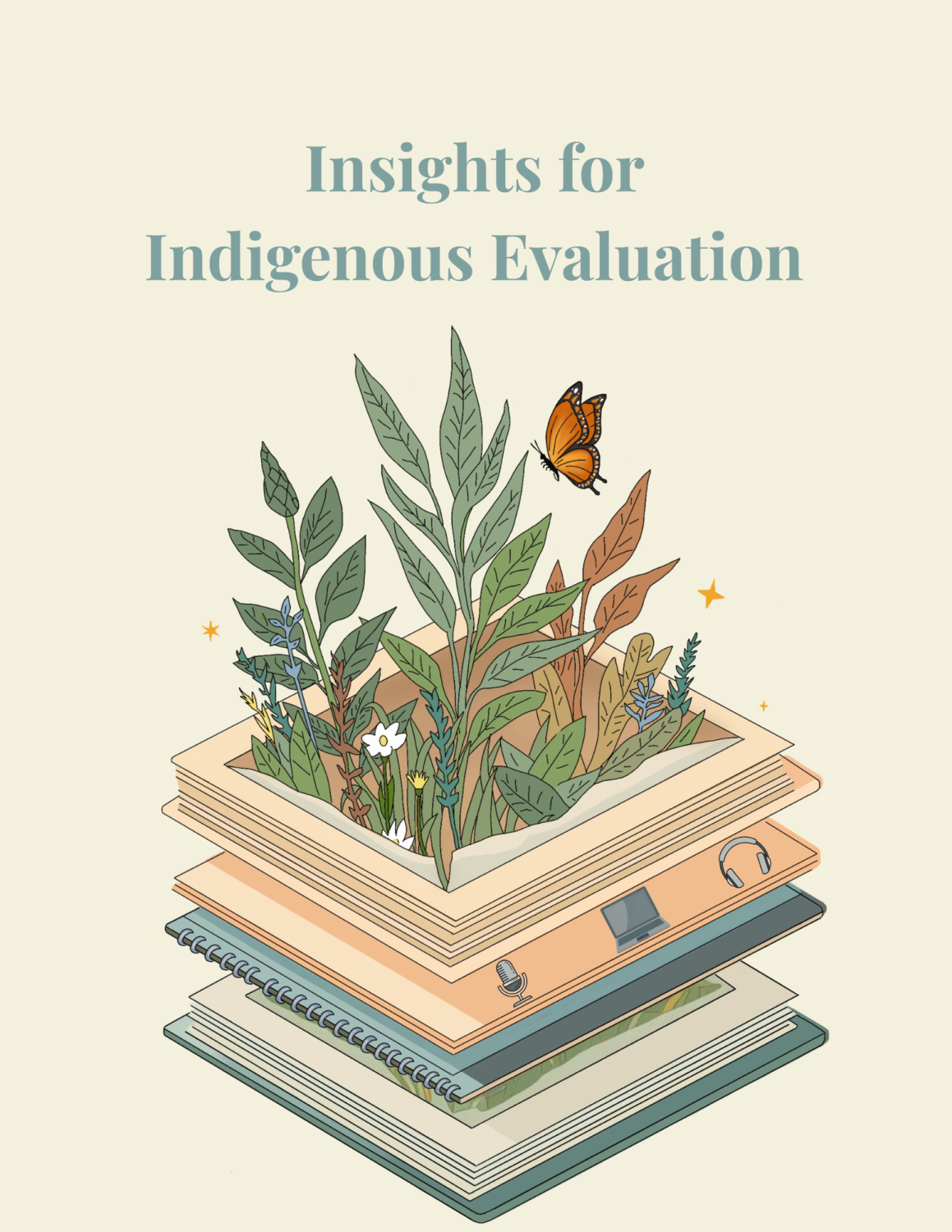Book Title: Insights for Indigenous Evaluation
Edited by Gladys Rowe (Swampy Cree); Nadine Flagel (Settler); and Taylor Wilson (Ojibwe, Cree, Filipina)

Download this book
Book Description: Insights for Indigenous Evaluation opens the bundle of stories, teachings, and wisdom that shape the growing field of equitable evaluation at the center of justice and reconciliation. Based on conversations from Indigenous Insights: An Evaluation Podcast, this collection brings together Indigenous evaluators, scholars, and community leaders to share how evaluation can be done differently: rooted in relationships, guided by spirit, and accountable to communities rather than funders. Instead of prescriptive models, the book offers multiple voices, perspectives, and practices that reveal evaluation as a living, relational process. Contributors explore shifts from deficit to strength, from extraction to reciprocity, and from control to love and responsibility. Readers are invited to listen, reflect, and imagine new possibilities for evaluation that strengthen Indigenous resurgence and support decolonial futures. Accessible, story-rich, and deeply grounded, this volume matters for anyone seeking to understand and transform how knowledge, value, and impact are defined and shared.
Contents
Book Information
Book Description
Insights for Indigenous Evaluation is an invitation into the heart of a field that is transforming how we understand knowledge, value, and impact. Edited by Dr. Gladys Rowe, this collection grows out of Indigenous Insights: An Evaluation Podcast and gathers conversations with Indigenous evaluators, scholars, knowledge keepers, and community leaders across Turtle Island, Hawai’i, and Aotearoa. Together, their voices reveal Indigenous evaluation as a living, relational, and strengths-based practice that resists colonial frameworks and offers pathways toward resurgence and decolonial futures.
Unlike conventional evaluation, which often imposes top-down frameworks and deficit-based measures, Indigenous evaluation centers community values, relationships, reciprocity, and accountability. It asks different questions: Who defines success? Whose voices shape priorities? How do evaluations strengthen community wellbeing, self-determination, and healing? In these conversations, evaluation emerges not as a technical exercise, but as ceremony, story, and responsibility that is deeply tied to land, ancestors, and future generations.
The book is structured as a bundle of insights: eight long-form interviews and seven excerpts are interwoven with reflective commentary and discussion prompts. Each chapter highlights a different perspective, spanning health, education, governance, and community organizing. Contributors include established leaders and emerging evaluators from many Nations alongside allies and collaborators. Their stories illuminate a wide spectrum of Indigenous evaluation practices, from grassroots community-led approaches to academic and institutional contexts, while confronting tensions between communities, funders, and research systems.
Key touchstones include: long-term relationships, data sovereignty and ownership, the role of spirit and ceremony, and the transformative potential of storytelling, art, and Indigenous knowledge systems. Rather than prescribing a single framework, Insights for Indigenous Evaluation emphasizes plurality, nuance, and the “ethical space” of dialogue – what Cree scholar Willie Ermine describes as the place where diverse ways of knowing meet with integrity.
Accessible in tone and story-rich in content, the book is suitable for a wide audience: students and instructors in social work, public health, and Indigenous studies; policymakers and funders seeking to better understand Indigenous perspectives; and community members who want to see their practices reflected and valued. It complements existing texts on Indigenous research by focusing squarely on evaluation as a site of change, learning, and resurgence.
At once practical and visionary, Insights for Indigenous Evaluation is both a resource and a ceremony – one that invites readers into relationship, challenges assumptions, and opens possibilities for evaluation that honours Indigenous peoples, lands, and futures.
License
Insights for Indigenous Evaluation Copyright © 2025 by Gladys Rowe is licensed under a Creative Commons Attribution-NonCommercial-NoDerivatives 4.0 International License, except where otherwise noted.
Subject
Social and ethical issues
